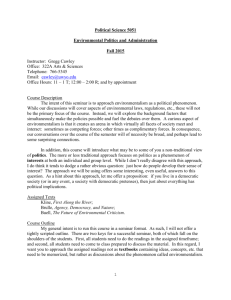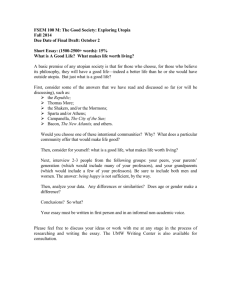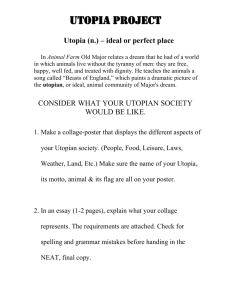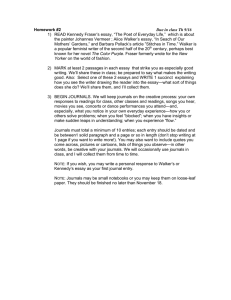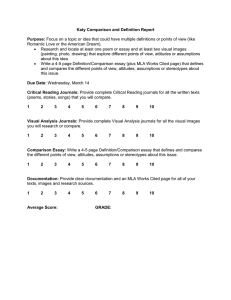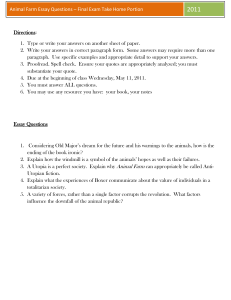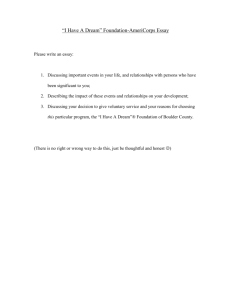POLS 5420-01: Governing Utopia
advertisement
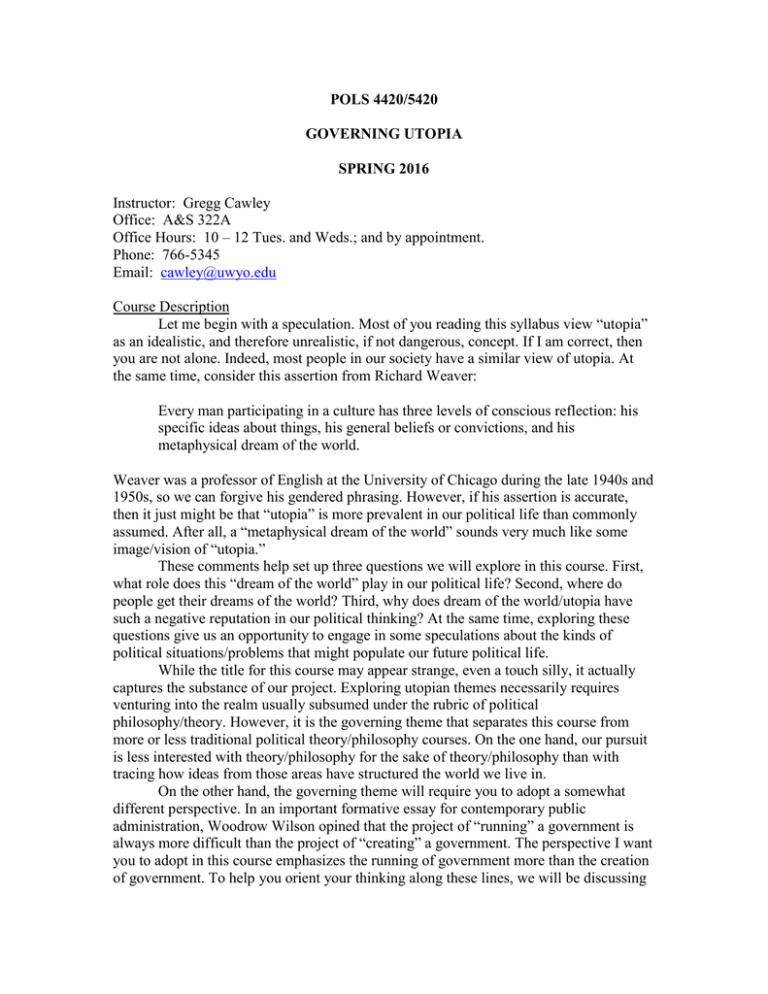
POLS 4420/5420 GOVERNING UTOPIA SPRING 2016 Instructor: Gregg Cawley Office: A&S 322A Office Hours: 10 – 12 Tues. and Weds.; and by appointment. Phone: 766-5345 Email: cawley@uwyo.edu Course Description Let me begin with a speculation. Most of you reading this syllabus view “utopia” as an idealistic, and therefore unrealistic, if not dangerous, concept. If I am correct, then you are not alone. Indeed, most people in our society have a similar view of utopia. At the same time, consider this assertion from Richard Weaver: Every man participating in a culture has three levels of conscious reflection: his specific ideas about things, his general beliefs or convictions, and his metaphysical dream of the world. Weaver was a professor of English at the University of Chicago during the late 1940s and 1950s, so we can forgive his gendered phrasing. However, if his assertion is accurate, then it just might be that “utopia” is more prevalent in our political life than commonly assumed. After all, a “metaphysical dream of the world” sounds very much like some image/vision of “utopia.” These comments help set up three questions we will explore in this course. First, what role does this “dream of the world” play in our political life? Second, where do people get their dreams of the world? Third, why does dream of the world/utopia have such a negative reputation in our political thinking? At the same time, exploring these questions give us an opportunity to engage in some speculations about the kinds of political situations/problems that might populate our future political life. While the title for this course may appear strange, even a touch silly, it actually captures the substance of our project. Exploring utopian themes necessarily requires venturing into the realm usually subsumed under the rubric of political philosophy/theory. However, it is the governing theme that separates this course from more or less traditional political theory/philosophy courses. On the one hand, our pursuit is less interested with theory/philosophy for the sake of theory/philosophy than with tracing how ideas from those areas have structured the world we live in. On the other hand, the governing theme will require you to adopt a somewhat different perspective. In an important formative essay for contemporary public administration, Woodrow Wilson opined that the project of “running” a government is always more difficult than the project of “creating” a government. The perspective I want you to adopt in this course emphasizes the running of government more than the creation of government. To help you orient your thinking along these lines, we will be discussing examples from the past and present which demonstrate the complexity of trying to run a government based on various visions. Finally, my approach to the course is somewhat unorthodox. As it turns out, there is a rather well developed body of literature and film that offers variations on the utopia theme. Equally important, much of this literature/film is presented as “entertainment.” Nevertheless, it has the effect of causing people to think and talk about most of the concepts and issues that are the mainstay of Political Science courses. Within this context, then, the intent of this course is to use a mixture of film and more traditional academic material to explore the general themes of utopia and governing. Assigned readings Kessler: Daring to Dream; Levitas: Utopia As Method; Spicer: Public Administration and the State. Other reading will be made available on the web site. Course Format This is a seminar so it will involve reading, writing, and discussion (which is to say no tests). The weekly class session will take two forms. Some weeks, we will watch a film in class and discuss it (some of the discussion may run into the next session); other weeks, we will discuss the assigned readings and other material. In my view, the defining characteristics of a “seminar” are these. First, they are about thinking and questioning material rather than just “learning” (or “memorizing”) it; second, and related, they require active participation on the part of you, the students. Taken together, these factors make seminars dynamic and somewhat unpredictable. My role in the seminar is to present you with material for thinking and discussing. Your role is to work with that material to see where it might take you and share your results with the rest of the participants in the seminar. Given the material we are covering, I know there will be plenty of room for spirited discussion. Two warnings about this course are warranted. First, some of the films we will watch have “R” rated material. Second, given the format of the course, IT IS IMPERATIVE THAT YOU ATTEND EVERY SESSION. Please understand that in a seminar format missing one session is equivalent to missing a week. I will give you each one “free” miss day and consider other absences on a case by case basis (I’m much easier to deal with if you contact me before missing a course than after missing). One or more unexcused absences will mean a zero for the attendance portion of your grade. Course Assignments I will make reading assignments in class (another reason why attending each class session is an imperative). I MIGHT ADD THAT A “READING ASSIGNMENT” REQUIRES BOTH READING THE MATERIAL AND REMEMBERING WHAT YOU READ. In addition to the assigned readings, all students will complete three writing projects. 1. Weekly journals (2 – 3 pages): Beginning Feb, 1 and ending April 18, you will be required to turn in a weekly journal. The journals will use a semi2 structured format, which is to say, sometimes I will give you a question or issue to address in your journal, and other times I will want you to react to material we discuss in class. The journals will be thinking/reaction pieces, and therefore, will not require outside research. Although I want the journals to be informal writing, I still want you to take a bit of care with them. Journals will be due by 5:00 PM on the assigned day (PLEASE NOTE THAT THE ASSIGNED DATES ARE MONDAYS, NOT CLASS DAYS). 2. The Kessler book provides a collection of utopian visions written by women primarily during the first half of the 20th century. I want each of you to pick two of the readings from this book and write “letters” to the writers. Each letter should be 5 – 7 pages in length, and you will be reading them in class. The basic format of the “letters” is to compare our current society to the visions offered by the writers. I will discuss this assignment more in class. Also, I will expect that each of you have read all the selections in the book. 3. A final essay (10 – 15 pages). We will discuss this assignment more in class, however, in general I will want each of you to prepare a final essay in which you stake out some sort of over all reaction to the material we will cover in class. Although the essay will not necessarily entail outside research (however you may do some if you want), I will nevertheless expect these essays to exhibit formal writing (which is to say that grammar, spelling, etc. will be part of the grade). The due date for the final essay is May 12 (finals week). Course Grade My inclination is to use the standard grading system, rather than the plus/minus system, for this course. However, I am willing to put the grading system up to a vote of the class during our first session. In any event, your final course grade will be based on the following components: class attendance (30%); journals (30%); “letters” (15%); and review essay (25%). I will take attendance each class session and I will be keeping track of your participation in class discussion, both factors will serve as the basis for your attendance grade. I will use a pro-rated pass/fail approach for the journals, that is, I will not grade each journal individually. Instead, I will calculate your journal grade as a percentage of your submissions—if you turn in all journals, you get 35 point; if you only turn in half of the journals, you will receive 17.5 points, etc. The “letters” will be grading primarily on a pass/fail basis. The final essay will be graded in on a standard writing basis. Additional Matters Academic Dishonesty: The Political Science Department, the University of Wyoming, and your professor take a very dim view about academic dishonesty. For a definition of academic dishonesty and the administrative procedures for addressing it go to this site: http://uwadmnweb.uwyo.edu/Pols/Academic_Dishonesty.doc Students found guilty of academic dishonesty in my courses will receive an F. 3 Special Needs: It is University of Wyoming policy to accommodate students, faculty, staff, and visitors with disabilities. If you have a physical, learning, sensory, or psychological disability and require accommodations, please let me know as soon as possible. You will need to register with University Disability Support Services (UDSS) in the Student Educational Opportunity offices, Room 330 Knight Hall, and provide UDSS with documentation of your disability. 4
